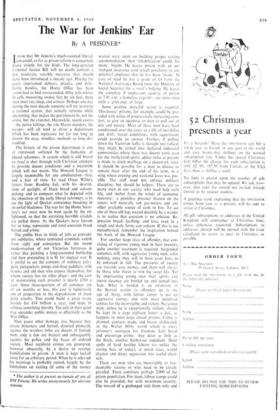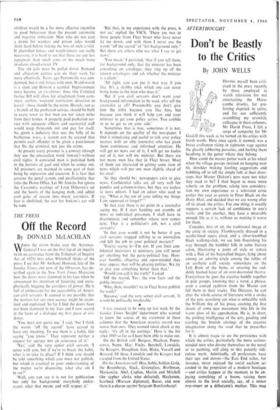The War for Jenkins' Ear By A PRISONER* T FEAR
that Mr Jenkins's much-vaunted liberal-
ism could, so far as prison reform is concerned, prove strictly for the birds. The long-gestated Criminal Justice Bill will no doubt contain a few moderate, sensible measures that should have been introduced a decade ago. Having for years imprisoned debtors, drunks, and milk- bottle bandits, the Home Office has been astonished to find overcrowded, filthy jails where, in cells measuring twelve feet by six feet, three men must eat, sleep, and urinate. Perhaps one day during the next decade someone will try to create a rational system, that actually reforms while chastening; that makes the punishment fit, not the crime, but the criminal. Meanwhile, recent events —the police killings, the vile Moors murders, the escapes—will all tend to drive a department which has been repressive for far too long to choose the easy, mindless methods so long dis- credited.
The history of the prison department is one of repression softened by the humanity of liberal reformers. A system which is still brutal au fond is shot through with Christian attempts to provide decent conditions and a treatment which will not maim. The Howard League is largely responsible for any amelioration—that, and a fear of riots. To read Oscar Wilde's letters from Reading Jail, with his descrip- tions of gaslight, of black bread and oakum- picking, and to compare what he depicted with the objectives of the early liberal reformers, is to see the light of Quaker conscience breaking in an awful blackness. The war for the Home Secre- tary's ear must now be won again by the en- lightened, so that the surviving horrible citadels are pulled down. As the Quakers have known for so long, repression and total coercion breed hatred and crime.
The public likes to think of jails as conveni- ent oubliettes, where convicted criminals vanish from sight and conscience. But the recent modernisation of our Victorian fortresses is rather like painting a long-cocooned battleship and then pretending it is fit for nuclear war. It is pitiful to see the contents of ordinary jails: petty pickpockets, pimps and drug peddlars, with drunks and old men who expose themselves, for whom society has no other place: and the cost of maintaining each prisoner is nearly £700 a year. Since three-quarters of all sentences are of six months or less, this cost is ludicrously out of proportion to the depredations of these petty crooks. You could build a great many hostels for £14 million a year, and hope to achieve something thereby. The jails in their quiet way squander public money as effectively as the War Office.
They cause other damage, too, because they create bitterness and hatred, directed primarily against the warders (who are decent, if limited, men; only a few are brutes) and subsequently against the police and the bases of ordered society. Most recidivist crimes are prompted, however obscurely, by a desire to revenge humiliations in prison. A man is kept locked away for an arbitrary period. When he is released his marriage is probably ruined, largely by the limitations on visiting (if some of the money * The author is at present an inmate of one of HM Prisons. He writes anonymously for obvious reasons. wasted were spent on building proper visiting accommodation, then 'rehabilitation' could, for many, begin). He leaves prison with an un- stamped insurance card which proclaims to any potential employer that he has been In case of need he has a grant of £4 from the
National Assistance Board (now the Ministry of Social Security) for a week's lodging. He leaves
the complete if unpleasant security of prison at 7.45 a.m. a homeless vagrant : one more man with a grievance at large.
Some positive merciful action is essential. 'Dosshouse' prisons, for example, could be pro- vided with wings of progressively increasing com- fort, to give an incentive to men to pull out of dirt and misery. Most of these men have been conditioned over the years to a life of instability and drift; hostel conditions, with supervision, could provide an answer. Further, if pulling down the Victorian hulks is thought too radical, they might be turned into sheltered industrial communities where there was decent work even for the methylated-spirits addict (who at present is made to stitch mailbags on a piecework rate). It should be possible for a man to choose to remain there after the end of his term, in a wing where evening and weekend leave was pos- sible. The staff need not enforce military discipline, but should be helpers. There are so many men in our society who need help with life, and shelter from the winds of economic necessity: a penniless prisoner thrown on the streets will naturally rob gas-meters and any other available source of cash to live. To see one of these old lags treated decently by a warder is to realise that coercion is no solution. Re- pression breeds loathing; and love, even in a rough and daily form, can redeem. If this is too metaphysical, remember the inspiration behind the work of the Howard League.
For another large class of offender, that con- sisting of vigorous young men in their twenties, quite another treatment is required. Suspended sentences will, with aggressive young men, solve nothing, since they will in most cases have to be enforced in full. The pressures of society are towards easy money, and there will always be those who thieve to win the sweet life. Yet by imprisoning young men their spirits and innate decency are bottled up and turned into hate. What is needed is an extension of the Borstal system to offenders up to the age of thirty, with labour camps to use up aggressive energy, and with more detention centres for the incorrigible and violent. No young man, unless he is exceptionally violent, should be kept in a cage eighteen hours a day, as happens in most large closed prisons. Crime is planned, contacts made, and boasts elaborated, in the Walter Mitty world which is every prisoner's surrogate for freedom. Jails breed and encourage crime: they deter as little as the birch, another barbarous expedient. Short spells of hard healthy labour (so unlike the sewing bees of today), at union rates, would chasten and direct aggression into useful chan- nels.
There are men who are incorrigible or irre- deemably vicious or who need to be closely guarded. These constitute perhaps 2,000 of the prison population. For them, labour camps could also be provided, but with maximum security. The reward of a prolonged visit from wife and
children would be a far more effective incentive to good behaviour than the present automatic and negative remission. Men who do not care a damn for warders and prison rules would think hard before risking the loss of such a visit. If electrified fences and watch-towers are really necessary, it is hard to see that these are any less repugnant than small arms or the much more insidious closed-circuit TV.
The old jails must be pulled down. Remand and allocation centres can do their work far more effectively. Years ago Pentonville was con- demned, but it still bulges with men. Wandsworth is a slum and Brixton a scandal. Imprisonment must become an exception: fines (the Criminal Justice Bill will allow for attachment from earn- ings); curfew; weekend restriction; direction to hostel—these should be the norm. Hostels, run as a branch of the probation service, should be built in every town so that men are not taken miles from their homes. A properly paid probation ser- vice with adequate officers and secretarial staff would keep thousands out and pay for itself. So, given a judiciary that sees the folly of its barbarous ways, a system can be created that permits each offender to be given a punishment that fits the criminal, not just the crime.
At present every prisoner is a convict (though they use the emasculate word 'inmate') without civil rights. A convicted man is punished both in the horrors of gaol and when he comes out. All prisoners are maimed in some part of their being by repression and coercion. It is fear that governs the penal system, and pusillanimity that rules the Home Office. Let Mr Jenkins but ignore the Cassandra wailings of Lord Dilhorne's set and the howls of the hanging mob, and admit cool gales of reason into musty corridors. If fear is abolished, the war for Jenkins's ear will be won.



































 Previous page
Previous page